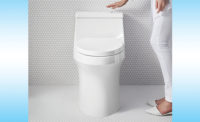John Passama, who will be sentenced in December to 21 to 33 months in prison, used customer addresses to create phantom installations and deposited their rebates into a bogus company, P.C. Properties. A total of $1.3 million was stolen between early 1996 and late 1998. Numerous phone calls to Passama's attorney were not returned.
The rebate program gives $50 to $100 rebates to customers using water-conserving toilets. An internal audit of the program uncovered 43 large payments to P.C. Properties. The false records indicated that P.C. Properties allegedly contacted apartment owners and convinced them to let it do the installations for them.
The audit also discovered that the majority of checks were paid to P.C. Properties, and additional checks were written to American Express travel-related services, an art gallery, a real estate agent and an auto body shop. The audit concluded that Passama purchased art, a home and other goods with the embezzled funds.
EBMUD filed a lawsuit alleging that Passama bought a 1999 Chrysler and a 1999 Chevrolet station wagon with some of the embezzled funds, according to a San Francisco Chronicle report. In October 1996, the suit alleged, Passama and his wife bought a new home worth $357,000 in Livermore, Calif.
The alleged recipients of the toilets and rebates were investigated, and none of them knew anything about the installations, said Charles Hardy, EBMUD spokesman. The FBI handled the prosecution once the EBMUD turned the case over to the bureau. The FBI was involved because federal funds were stolen.
"Initially we found only $945,000 that was stolen," Hardy said. "But after the FBI made the arrest, we were allowed to complete our own investigation and found the remaining $355,000. We collected $190,000 from the sale of Passama's house, and the utility also had fraud insurance, which produced $1 million. The balance was covered by another carrier."
He added: "We have made changes to the rebate program as a result of this experience. We no longer issue cash rebates. Now a customer must put in for the rebate and then they will receive a credit on their utility bill. This is the first time something like this has happened in the 75-year history of the utility and we're glad it's over."




